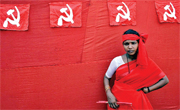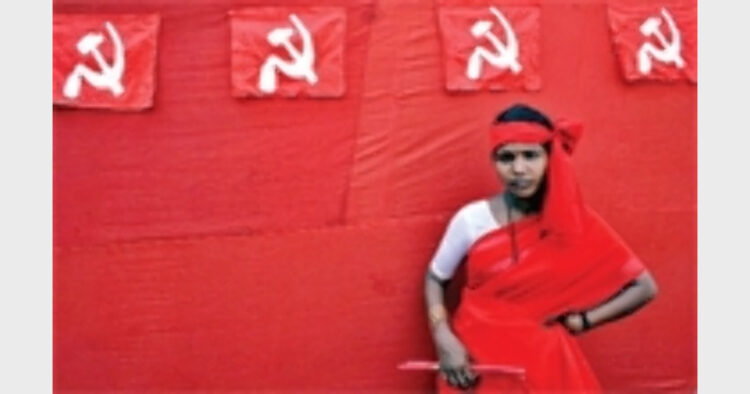 While security agencies can meet the Maoist
While security agencies can meet the Maoist
challenge on the war front, the information front remains uncontested
In the later months of 2011, the security agencies and Chhattisgarh police caught some Maoists red handed taking 15 lakh Rupees from an agent of a major corporate group in a Bastar town. According to details released by police, one of them was a young man Linga Ram who was already on the police radar for his pro-Maoist links. Other was Soni Sori, his aunt who, according to police, managed to slip out in the melee in a crowded hat bazar, but was soon apprehended from Delhi from a Leftist hideout.
Investigators found that the Maoists were taking this money from a corporate house which had been on the receiving end of threats and attacks by them for past many years. Soni Sori was already named in some preceding attacks on the corporate’s property in the area. The payment was supposed to be part of much larger deal which was aimed at buying peace and freedom to function in the three states of Chhattisgarh, Odisha and Andhra Pradesh. Very soon a local journalist too was booked for receiving unusually high amounts (a few crore rupees) allegedly for connecting it to various Maoist underground leaders.
Initially the security agencies looked high and happy over this ground breaking achievement. But very soon they were shocked to see the tables turning over them and the entire State establishment. The propaganda war that followed over coming months and years at the national and international levels by a host of Leftist NGOs, international right agencies, political leaders, national media houses and self styled champions of human rights and woman rights in universities across Bharat was so overwhelming that neither the State government nor its officials involved in the case could manage to withstand this propaganda assault.
Not only that high profile names like Ms Arundhati Roy and respected legal luminaries like Mr Prashant Bhushan lent their names to the campaign and legal action, many dubious looking international groups which appear to be hosted and funded by the international Christian conversion establishment used this case for painting Bharat as a society which practices ‘apartheid’. One international website supporting a name like “United Black Untouchables….” and another sounding as “Indian Holocaust….” posted identical appeals, contributed by a known Leftist propagandist Mr Himanshu Kumar who claimed it to be made by Linga Ram, one of the accused, under title “The Very Right Of Living In This Country Has Been Snatched From Me”.
Among a host of literature distributed to win sympathy for Soni Sori, I came across a colourful pamphlet which shows a big picture of a dreadfully rough stone with a provocative title that reads “HOW WOULD YOU FEEL IF FIVE POLICEMEN HOLD YOU DOWN AND PUSHED THIS INTO YOUR ANUS”.
In a country where the success of a high profile legal criminal case depends heavily on the enthusiasm and commitment on the part of establishment and prosecution; guts of the witnesses and; the courage of the justice delivery machinery to go beyond prevailing political correctness to deliver right justice. It was no surprise that the State government and its agencies found it safer to play safe and let the case flop. The story concludes at Ms Soni Sori thumbing her nose at the Indian establishment when she contested Lok Sabha elections on Aam Admi Party”s ticket in Bastar, though unsuccessfully. This episode presents a perfect example of the might of public perception, the Bharat leftists’ capabilities to manage it.
The Bharateeya Left, especially the Maoists, thrive considerably on the gullibility of section of Bharateeya intellectuals who may not be Leftist by their own belief, but easily fall prey to the desire of looking good and politically correct. A typical example was senior journalist late Vinod Mehta, the founding editor of Outlook magazine. Though he himself lived life of a typical ‘bourgeois’, he always appeared more than enthusiastic about letting Leftists use his magazine for their anti-establishment propaganda. On one such occasion he allowed Ms. Arundhati Roy to publish her infamous and an unusually massive essay (over 32,000 words long) titled Walking With The Comrades. The essay not only denounced and challenged the authority of the Bharateeya democratic establishment but it also praised and justified the anti-Bharat and violent campaigns of the Maoists.
Mehta would frequently host yet another rabid Maoist propagandist Comrade (Ms.) Nalini Sundar of Delhi University to propagate the Maoists” case through Outlook. In one such story she not only justified, rather glorified the Jeeram Ghati mass killing of almost entire senior Congress leadership of Chhattisgarh by the Maoists in 2013, especially that of tribal Congressman Mahendra Karma who had launched Bastar tribals’ movement ‘Salwa Jud’m’. The case of Bharateeya leftists’ successful manipulation of entire national and international media, the advocacy community and finally the justice delivery system in branding “Salwa Judoom” as a “state sponsored terror group” can pass as a perfect text book case of how to manipulate public opinion and policy making in a
democracy.
My search found more than 20 different news features, exclusively dedicated to Soni Sori, in a reputed Indian magazine TEHELKA. Even scientific and neutral looking publications like ‘Down To Earth’, published by the Centre for Science and Environment under the leadership of environmentalist Ms Sunita Narain, has been allowing the Maoist propaganda to be dished out in the name of environment Bharateeya tribal rights. On the other hand, Bharateeya media were able to completely blackout the news of an event of greatest civic magnitude in the history of free Bharat when Maoists blew off power transmission towers in the Bastar region of Chhattisgarh in May and June months of 2007. While millions of citizens of Bastar region, tribal and non-tribal alike, were forced to live without basic facilities like the hospitals and drinking water, the media mangers of Maoists badly exposed the vulnerability of the civic structure as well as the inefficiency of the nationalist media.
Besides this, there are innumerable websites, active on the internet that have emerged as the biggest funding conduit for the Leftist propaganda network in Bharat. There are many glaring examples of arrested Maoist leaders like Binayak Sen, Kobad Ghandy, GN Saibaba and Sudhir Dhawale who Managed to receive media support.
It is unfortunate that the political community of Bharat has miserably failed in realising the real dangers behind the growing Maoist menace. The ever growing urban propaganda machine of Maoists and their supporters too have58 yet to find their match among the government establishment, the nationalist political parties as well as the intellectual community of Bharat. One only hopes they wake up before it is too late.
Vijay Kranti (The writer is a senior journalist and Chairman, Centre for Himalayan Asia Studies and Engagement)














Comments